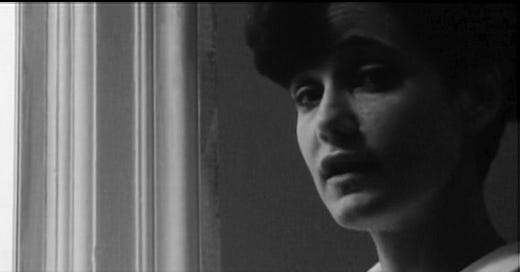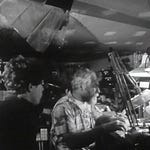"The inconceivable seems possible." – ROTTERDAM INTERNATIONAL
The film is infused with a spiritualistic approach to life and death, a sort of mix between New Age, astrology and Herman Hesse’s “fate rules” philosophy.” - VARIETY———
"Intended as a tribute to Jean Cocteau's classic ORPHÉE, Rick Schmidt gives the Orpheus legend a very contemporary twist. Here the central bond, the love that reaches beyond death, is not between a young man and woman, but between a mother and her small daughter. Shot in a lean, composed style, what is particularly striking about Schmidt's film is its sense of intimacy and simple emotional honesty. He encourages his actors to draw upon their own lives, their experiences of love and loss, in developing their characters, with highly satisfying results. This makes the film's few flights of fantasy all the more powerful, mysterious, and finally unsettling. AMERICAN ORPHEUS casts its own distinctive spell." – SEATTLE FILM FESTIVAL————-
Shooting On A Shoestring -- Rick Schmidt Relies On Planning, Serendipity - But Little Money - To Create Films. – Ferdinand M. De Leon THE SEATTLE TIMES
In an age when the record for the most expensive movie ever made gets blown to bits with every new Schwarzenegger robot flick, Rick Schmidt still believes it's possible to make feature films on a shoestring budget. It was a point Schmidt, author of the popular "Feature Filmmaking at Used-Car Prices," proves with his latest project, "American Orpheus," which he shot in Port Townsend last month. The entire budget for the film, now in its post-production phase, is expected to come to about $45,000 - a mere fraction of the $75 million to $100 million rumored to have gone into the glitzy special effects in "Terminator 2."
How does Schmidt do it? With a lot of planning, a willingness to be flexible about those plans, and - most important - a sharp eye focused on ways to cut costs.
"American Orpheus," for example, was filmed largely in Schmidt's house in Port Townsend, which cut down on the time and money wasted by running around from one shooting location to another, Schmidt explained. The garage doubled as the second set and represented a cottage in the film. "During the filming, I used locations near my house," said Schmidt, who uprooted his family from the San Francisco area to move to Port Townsend in December. "I looked for a central location that offered great visual possibilities."
During filming, Schmidt does longer takes and avoids having to use a second camera by using the "freeze" technique. Instead of saying "cut," he shouts "Freeze!" and the actors hold their position, while the director moves the camera to another location. He then feeds the actors the last line and the actors pick up where they left off. Instead of paying to have the titles for the opening and closing credits added to the film in post production, Schmidt used acetate that he placed on a glass window and then filmed.
Schmidt also casts "real people" for roles in the movie, and had assorted family members and friends helping out on the project - following a practice from earlier films, Flexibility is also a must when you don't have much money. "Once you're shooting, everything has to be considered for the best," Schmidt said. "If it rains, shoot in the rain. If an actor leaves, use someone else. Have your eyes open, and pick up on the gifts that occur." Schmidt said when he was in Boston he met a professor who introduced him to one of his top students. They talked and she said she was coming to Seattle at the same time of the filming. She ended up playing a character in the movie.
Despite being low-budget, Schmidt's films have garnered some recognition. His last movie, 1989's "Morgan's Cake" was a finalist at the Sundance Film Festival. That film, which cost $15,000, eventually lost out to "sex, lies, and videotape," which, as Schmidt points out, cost $1 million. Eventually Schmidt's movie played at a dozen international film festivals and received a favorable review from The New York Times.
"American Orpheus," Schmidt's biggest project to date, started with the idea of exploring love and death in a modern version of the legend of Orpheus, the musician who descends into the netherworld to reclaim his wife. Schmidt's version, however, focuses on the bond between an unmarried woman and her young daughter, and examines single parenthood. "It seemed to me a living hell," Schmidt said. "For her to work all day long and then have to come home to be a mom. Where do you fit in a relationship with a person? Where do you get a break?" Money for the film was raised partly through a $25,000 grant from the National Endowment for the Arts. Additional funding was provided by investors and Schmidt's own money.
Watch AMERICAN ORPHEUS (84 MIN.) here.
—————-














Share this post